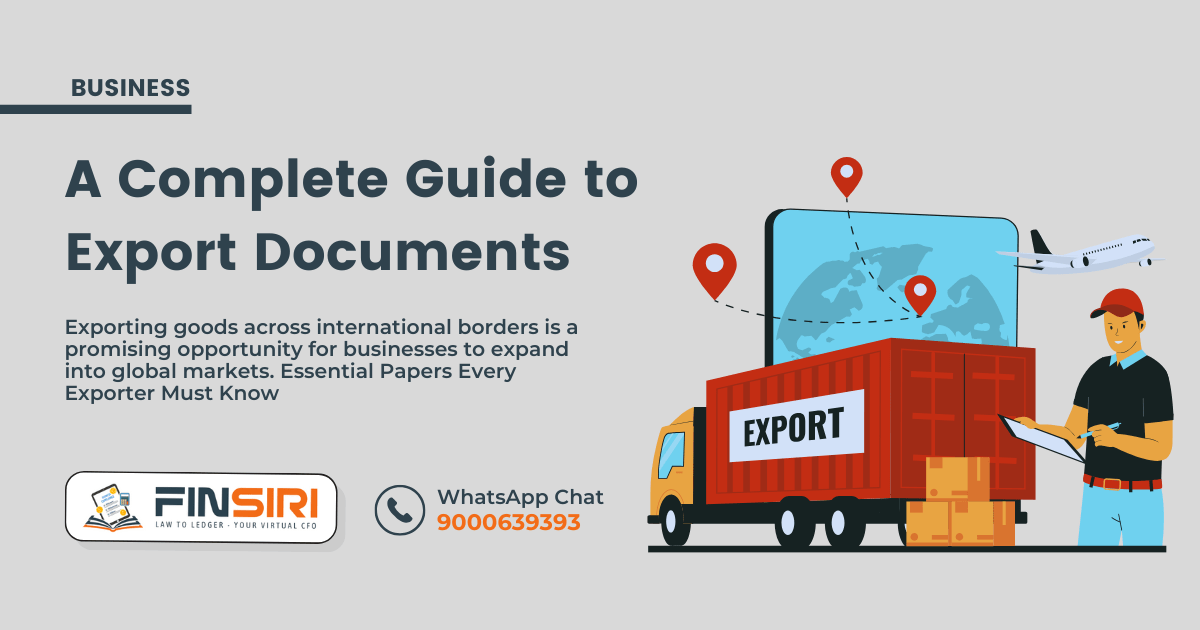Expanding into international markets is a major growth opportunity for businesses, but success in exports depends on more than just selling products—it requires compliance with global trade rules. Proper export documentation is the foundation of a hassle-free export process. From customs clearance to payment assurance, every document plays a vital role in international trade.
If you’re exploring the export procedure in India, understanding the mandatory export documents list is crucial. This detailed guide covers all the documents exporters must prepare and explains how they streamline the export process.
1. Commercial Documents in Exports
Commercial documents form the core of international trade. They outline the value of goods, terms of sale, and support customs clearance.
- Proforma Invoice – Issued as a quotation before the final invoice; useful for buyers to secure import licenses or arrange payment.
- Commercial Invoice – The final bill that confirms the sale of goods, including buyer and seller details, price, and terms.
- Packing List – Provides information on weight, measurements, and packaging of goods for verification by customs.
- Commercial Invoice-cum-Packing List – A combined format widely accepted by customs authorities.
- Bill of Exchange – Acts as a financial instrument between exporter and importer for payment settlement.
2. Shipping & Logistics Documents
Smooth shipping requires logistics paperwork that verifies shipment details and ensures proper tracking.
- Shipping Bill – A mandatory customs clearance document in the export procedure in India.
- Bill of Lading / Air Waybill – Serves as proof of shipment and represents a contract of carriage with the carrier.
- Waybill Number – Enables shipment tracking and logistics identification.
Let Export Order (LEO) – A clearance granted by customs to allow goods to be shipped.
3. Regulatory Licenses & Codes
Export compliance requires adhering to legal frameworks and obtaining the right licenses.
- Import Export Code (IEC) – A compulsory registration number for all exporters in India.
- Export License – Required for restricted or controlled goods.
- AD Code (Authorized Dealer Code) – Needed for processing foreign exchange transactions and filing the shipping bill.
- HS Code (Customs Commodity Code) – Classifies goods for customs duties and compliance.
GST Certificate – Proof of Goods and Services Tax registration for exporters.
4. Certificates for Export Process
Depending on the type of product, additional certificates may be required to prove authenticity, quality, and safety.
- Certificate of Origin – Identifies the country where goods are manufactured.
- Inspection Certificate – Confirms goods meet buyer specifications and regulatory standards.
- Insurance Certificate – Protects goods against risks like damage or loss during transit.
- Health Certificate – Mandatory for food, medical, and pharmaceutical exports.
Phytosanitary Certificate – Required for plant-based and agricultural goods to ensure they are pest-free.
5. Customs Declarations
These documents ensure legal clearance of goods across international borders.
- Customs Declaration Form – Declares details of goods, value, and exporter/importer details for customs.
- Bill of Entry – An import clearance document used at the buyer’s end, sometimes shared with the exporter for record-keeping.
6. Additional Supporting Documents
Certain documents provide payment security and detailed product information.
- Letter of Credit – A bank guarantee assuring the exporter of payment once terms are met.
- Full Description of Goods – Detailed product information provided to both customs and buyers.
Invoice Date – Records the timeline of the transaction and supports financial compliance.
Why Export Documentation is Important?
Every document in the export documents list serves a critical function—whether it is verifying shipment details, ensuring export compliance, or guaranteeing payment. Missing or incorrect paperwork can delay shipments, increase costs, or even result in shipment rejection.
By mastering the export procedure in India, businesses can avoid costly mistakes and ensure faster delivery to global buyers.
The export process may seem overwhelming, but with the right documentation, exporters can ensure smooth operations, build trust with international buyers, and expand successfully into global markets. Whether you’re a first-time exporter or an experienced business, staying updated on the latest requirements of export documentation is the key to long-term success.




